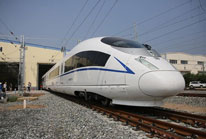

How China and the Vatican City will improve ties has been under close scrutiny in recent months, with a top Catholic Church leader recently hinting that talks between the two sides over the key bishop appointing issue have made progress.

After decades of waiting and negotiations, a top Roman Catholic Church leader has publicly announced that the long-running Sino-Vatican dialogue has finally made some progress on critical issues that have held ties back.
Cardinal John Tong Hon published an article in the Hong Kong media on August 4 explaining the Vatican's position on many crucial issues regarding its relations with Beijing.
His piece came just before Beijing and the Vatican hold another round of negotiations this month - talks which are apparently close to reaching a preliminary agreement, according to the Union of Catholic Asian News (UCAN).
In Cardinal Tong's article, he said the Chinese government is now willing to reach an understanding with the Holy See on the key question of how Chinese Catholic bishops are appointed, perhaps the biggest obstacle that has blocked the normalization of bilateral relations.
Cardinal Tong said the purpose of his article was to both dispel Beijing's lingering doubts as well as to reassure those in the Church that it was not about to give up its principles in exchange for opening the door to China.
Centuries-old acquaintances
The Catholic Church has a long history in China. Italian Jesuit and cartographer Matteo Ricci came to China in the late 16th century and through his sharing of knowledge and fluency in Sinitic languages eventually gained access to the court of Ming Emperor Wanli. Ricci was eventually buried in Beijing with the emperor's approval.
Ties became rocky after the Communist Party of China's rise to power. The two sides broke off relations after Vatican envoy Antonio Riberi was expelled from the country in shady circumstances in 1951. Now the Vatican City is the only Western state without diplomatic ties with Beijing.
However efforts to improve ties have remained a constant. Pope Francis has made improving links with China a priority since he was elected in 2013.
According to a July 14 Reuters report, the negotiations between China and the Vatican have quickened since a working group was established in April. Both sides are now reportedly ready to sign an accord although the details have not yet been disclosed.
The day after the report, Chinese Foreign Ministry spokesperson Lu Kang said "We are willing, on the basis of the relevant principles, to continue having constructive dialogue with the Vatican side, to meet each other halfway and jointly promote the continued forward development of the process of improving bilateral ties. We hope the Vatican can likewise take a flexible and pragmatic attitude and create beneficial conditions for improving bilateral relations."
Cardinal Tong started writing his article on May 24, the World Day of Prayer for the Church in China. He told AsiaNews that the purpose of his article is to help promote dialogue between the Church in China and the broader Church, and between the Chinese government and the Holy See.
"The goal of the dialogue between the Holy See and Beijing is to strive for and protect the rightful religious freedom and rights of the China Church that are written in the Chinese Constitution. The Holy See hopes to point out that the Catholic Church respects the legal sovereignty of the country, the legitimate power and responsibility of its rulers and its laws," the cardinal said.
Bishop blockade
The Catholic Church in China is divided into two communities: the 5.5 million members under the supervision of the State-sanctioned Chinese Catholic Patriotic Association(CCPA), and the "underground" church, which swears allegiance solely to the pope. Experts believe that the underground church is considerably larger than the CCPA.
According to Chinese officials, there are currently 110 bishops in China, most of whom have been sanctioned by both the Chinese government and the pope. But there are eight bishops who don't have papal approval. They are considered illegitimate by the Vatican. There are also another 30 bishops who are part of the underground church and have received papal, but not government, support.
According to Reuters, Pope Francis is preparing to recognize the eight bishops while Beijing is to legitimize the 30 underground church bishops in return. Cardinal Tong said future bishops' conferences in China will include bishops from the CCPA and the underground church.
How to deal with the CCPA is another conundrum both sides have to face. In his 2007 letter to Chinese Catholics, Pope Benedict XVI wrote that the CCPA is "incompatible with Catholic doctrine."
The most sensitive issue is the future selection of bishops. Cardinal Tong said the two sides are now close to reaching a mutually satisfactory arrangement.
China has insisted on electing and ordaining its own Catholic bishops over the past 60 years, claiming outside powers should not interfere in China's internal affairs. But the Catholic Church believes that local churches have no authority to appoint their own bishops.
In his article, Tong suggested that a model similar to the one used in Vietnam since 2010 could be applied. In this system, the government and the Church collaborate to narrow down a list of candidates until they can choose a man that they both find acceptable.
Underground believers
Agostino Giovagnoli, a professor of contemporary history at the Catholic University of Milan who closely follows the Vatican's relationship with China, told the Global Times that the cardinal's article is highly significant.
"It's the first time Cardinal Tong, who is well known as serious, reserved and cautious, speaks so clearly. He had never made rash statements. If he chooses to speak at this time it is just because he thinks there have been important developments in the negotiations. So he thinks the time has come to make the decision and, very softly but very firmly, says that the decision must be positive, because this agreement is not a victory of one of the two sides, but it's a win-win deal," Giovagnoli said.
"Cardinal Tong knows very well that between China and the Vatican there was a very long and difficult history; there have been many conflicts and many opportunities have been wasted; today the greatest obstacle is the lack of confidence and mutual misunderstandings. Precisely for these reasons, he chooses to encourage the two sides to trust each other and he gives a good example in declaring his confidence in the results of the negotiations even though we still do not know about these results," the scholar added.
While many Catholics have expressed their appreciation for the cardinal's efforts to help the negotiations along, others expressed skepticism towards his optimistic outlook, fearing that this dialogue will lead to nothing.
The most outspoken critic of the talks is Cardinal Joseph Zen, a former Hong Kong bishop, who is seen by some as the spokesman for underground Catholics in China. In a recent article Cardinal Zen spoke with great fervor of his doubts regarding the future of the underground church in China, which he says have been "forgotten" by the Vatican, according to UCAN.
Elisa Giunipero, a researcher at the Catholic University of Milan who has studied the history of the Catholic Church in China for 20 years, told the Global Times that she believes the present dialogue between Beijing and the Holy See will not sacrifice the legitimate rights of the clandestine communities and their difficulties will not be forgotten.
"On the contrary, through dialogue and negotiation, it will be possible to improve conditions for both the open and underground Catholic communities in China," she added.
Control concern
While the Vatican is sending signals to Beijing that it is willing to make compromises to establish relations with China, the Chinese government still seems somewhat suspicious.
On July 10, the People's Daily published three articles reiterating the importance of "sinicization" and asking religious groups to "resist control from a foreign version of the same religion." This was the first time this phrase was used, and it is believed to have been aimed at the Vatican.
On July 31, Sun Chunlan, head of the United Front Work Department (UFWD), the top CPC organ in charge of religious issues, stressed that "there is no subordinate relationship" between religions in China and those outside China.
Interpreting a speech made by Chinese President Xi Jinping at the National Conference for Religious Work in April, Sun noted that there are now 200 million religious believers in China, and being too loose or too tight on religious management are both incorrect methods.
On August 7, after Cardinal Tong's piece was released, Wang Zuoan, head of the State Administration for Religious Affairs (SARA), urged the public to be alert to attempts of "hostile foreign forces" to alter China's ideology and political system through the use of religion. Wang emphasized that China must firmly control the leadership of the Catholic Church in China.
Interview requests sent to the UFWD, SARA and Chinese Catholic Patriotic Association were not answered as of press time. Cardinal Tong's office said he expressed everything he wanted to in his article.
Yang Fenggang, the founding director of The Center on Religion and Chinese Society at Purdue University in the US told the Global Times that Beijing may gain more benefits from this deal not only because the Vatican will first cut its official ties with Taiwan, but also as it will improve China's international image.
Tsung-ming Chen, director of research at Ferdinand Verbiest Institute, a Belgian Catholic institute committed to the dialogue between Europe and China, told the Global Times he believes Beijing's biggest concern is losing control over churches in China.
Liu Peng, a former UFWD official and director of the Beijing Pu Shi Institute for Social Sciences believes that the principles that the Vatican raised in its proposal are acceptable to Beijing. Besides, any Sino-Vatican cooperation on ordaining bishops would show China's confidence and openness to the world, as well as its respect for religious belief and Catholicism.
"It is in the best interests of the Vatican, Beijing and Chinese Catholic churches if an agreement could be reached," Liu said.
 World's fastest bullet train to start operating next month
World's fastest bullet train to start operating next month Huangluo: China's 'long hair village'
Huangluo: China's 'long hair village' Spectacular bridge with one of the tallest piers in the world
Spectacular bridge with one of the tallest piers in the world Magnificent view of Hukou Waterfall
Magnificent view of Hukou Waterfall A glimpse of Stride 2016 Zhurihe B military drill
A glimpse of Stride 2016 Zhurihe B military drill US Navy chief tours Liaoning aircraft carrier
US Navy chief tours Liaoning aircraft carrier Chinese American woman wins Miss Michigan
Chinese American woman wins Miss Michigan Centenarian couple takes first wedding photos
Centenarian couple takes first wedding photos Traditional Tibetan costumes presented during fashion show
Traditional Tibetan costumes presented during fashion show Top 10 livable Chinese cities
Top 10 livable Chinese cities Top 20 hottest women in the world in 2014
Top 20 hottest women in the world in 2014 Top 10 hardest languages to learn
Top 10 hardest languages to learn China’s Top 10 Unique Bridges, Highways and Roads
China’s Top 10 Unique Bridges, Highways and Roads Celebrity split grips nation, triggers debate on marriage
Celebrity split grips nation, triggers debate on marriage Chinese fans of S.Korean pop culture stay loyal despite rumored ban
Chinese fans of S.Korean pop culture stay loyal despite rumored ban Is bronze good enough for Chinese fans?
Is bronze good enough for Chinese fans? Foreign actors in China share their experience dramatizing one-dimensional and stereotyped roles
Foreign actors in China share their experience dramatizing one-dimensional and stereotyped rolesDay|Week